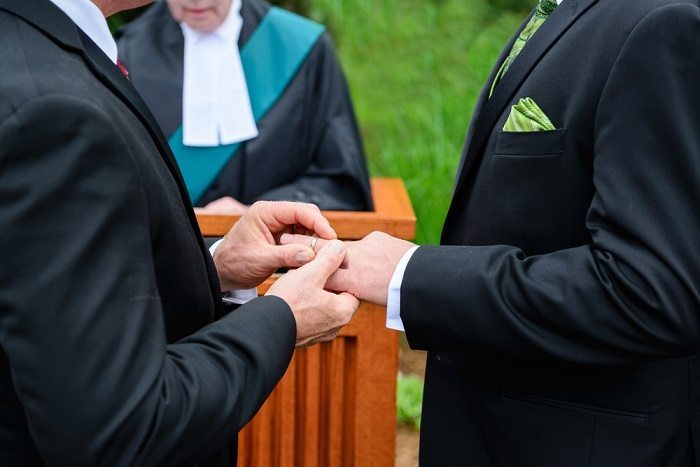Fifth Circuit Hears Marriage Equality Arguments as Supreme Court Considers Stepping In
The conservative Fifth Circuit Court of Appeals considers marriage equality bans in Texas, Louisiana, and Mississippi the same day the Roberts Court considers stepping into the fray.

A panel of judges from the conservative U.S. Court of Appeals for the Fifth Circuit will hear arguments Friday in a trio of cases looking to advance marriage equality in the South.
The cases involve three separate challenges to marriage equality bans in Texas, Louisiana, and Mississippi. In all but one case, the Louisiana challenge, lower court judges ruled in favor of marriage equality. Judges in both Mississippi and Texas had ruled those states’ bans on marriage equality unconstitutional.
Fifth Circuit Judges Jerry E. Smith, James E. Graves, and Patrick Higginbotham will hear Friday’s arguments. Smith is a President Reagan appointee and has developed a reputation as a conservative, partisan judge. Higginbotham is also a Reagan appointee.
Graves is a 2011 appointee of President Obama.
Friday’s argument takes place at the same time the United States Supreme Court considers, for the second time this term, whether to enter into the marriage equality debate raging in the states. The Court on Friday will consider five new marriage equality challenges, including a request from Louisiana to bypass the Fifth Circuit and take up the issue now.
The remaining cases scheduled for Friday’s Supreme Court conference include marriage equality challenges in Ohio, Kentucky, Tennessee, and Michigan. But unlike in October when the Roberts Court denied review of cases from Wisconsin, Oklahoma, Utah, Virginia, and Indiana challenging rulings in favor of marriage equality, the cases scheduled for Friday’s conference involve later rulings upholding bans on same-sex marriage. This disagreement among the federal courts as to whether states can constitutionally ban marriage between same-sex couples makes it more likely the Roberts Court will agree to take up the issue this time.
At last count, 36 states recognize marriage equality, with Florida becoming the latest to do so Monday. Only nine states and the District of Columbia recognized marriage equality when the Supreme Court heard arguments in 2013 challenging the federal Defense of Marriage Act and California’s Proposition 8.
The Supreme Court could rule as early as Friday on whether it will take up the marriage equality cases, or it could wait until Monday when the Court typically releases its orders.
A decision from the Fifth Circuit could take months. Should the Roberts Court on Friday agree to hear one or all of the marriage equality cases, that would mean a ruling on the issue would come this summer.

